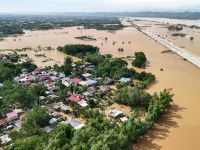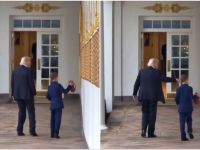Maoist rebels killed six policemen in Nepal, police said Sunday, a day after the rebels broke a ceasefire by killing at least 40 security personnel and civilians.
An emergency meeting of the ruling Nepali Congress (NC) labelled the Maoists "terrorists" and gave the government permission to use all "constitutional and legal provisions to give the people a sense of security."
However, it stopped short of allowing Prime Minister Sher Bahadur Deuba to declare a state of emergency in the areas worst affected by the Maoist violence.
Declaring an emergency would have allowed Deuba to use the full force of the army against the rebels.
Instead, the NC asked for a report, due Monday, on the legal provisions around declaring an emergency after some objections that it could go against democratic principles, a NC source said.
The government has previously held back from fully deploying the army to fight the rebels, fearing it could lead to civil war.
The six policemen who were killed were among 44 others who had been missing since Saturday evening when the bus they were travelling in was ambushed by the rebels in the southwestern Surkhet district.
Police said the other 38 policemen, who had been feared dead, were reported to be safe.
The Maoists, who have been fighting since 1996 to overthrow Nepal's constitutional monarchy, broke a four-month ceasefire with a wave of attacks on Friday.
Fourteen soldiers, 24 policemen and two civilians were killed in Maoist attacks in the western Dang and Syangja districts, Home Minister Khum Bahadur Khadka said Saturday.
The rebels had also stolen 99 semi-automatic rifles.
Khadka said the army may have killed between 70 and 80 rebels in retaliation, although he had not been able to confirm the reports.
A statement after the NC meeting said: "In view of the violent developments in Dang, Surkhet, Syangja to the far west and southwest, and other parts of the country, the party has drawn the attention of the government to use all the constitutional and legal provisions to give the people a sense of security."
"At a time when the government was trying to hold the fourth round of peace talks with them, the Maoists have foiled all such efforts and resorted to violence and terrorism," it said.
"The ruling party condemns the Moists for their terrorism."
Maoist leader Pushpa Kamal Dahal claimed in a statement Saturday that his forces had resumed their violent campaign after being provoked by "fascists and anti-nationalists."
He described Friday's attacks as "successful and brave," saying they were carried out by the recently formed People's Liberation Army of Maoist militants.
However, he said he still wanted to seek a political solution to end the conflict.
More than 1,800 people have died in violence since the rebels started their campaign in 1996 to overthrow Nepal's constitutional monarchy and establish a Maoist republic.
Hopes had risen that a settlement between the two sides could be reached when a ceasefire was called in July.
Three rounds of peace talks have taken place since then. But this week the Maoist leader warned the ceasefire "could become meaningless" unless the peace process made some headway.
The talks had stalled over the rebels' demand for a republic. Earlier this month they said they had "deferred" the demand ahead of a fourth round of talks, which was supposed to take place in the next few weeks.
But the Maoists were still insisting a "constituent assembly" be formed to redraft the constitution, something the government opposes – Kathmandu (AFP)
© 2001 Al Bawaba (www.albawaba.com)







